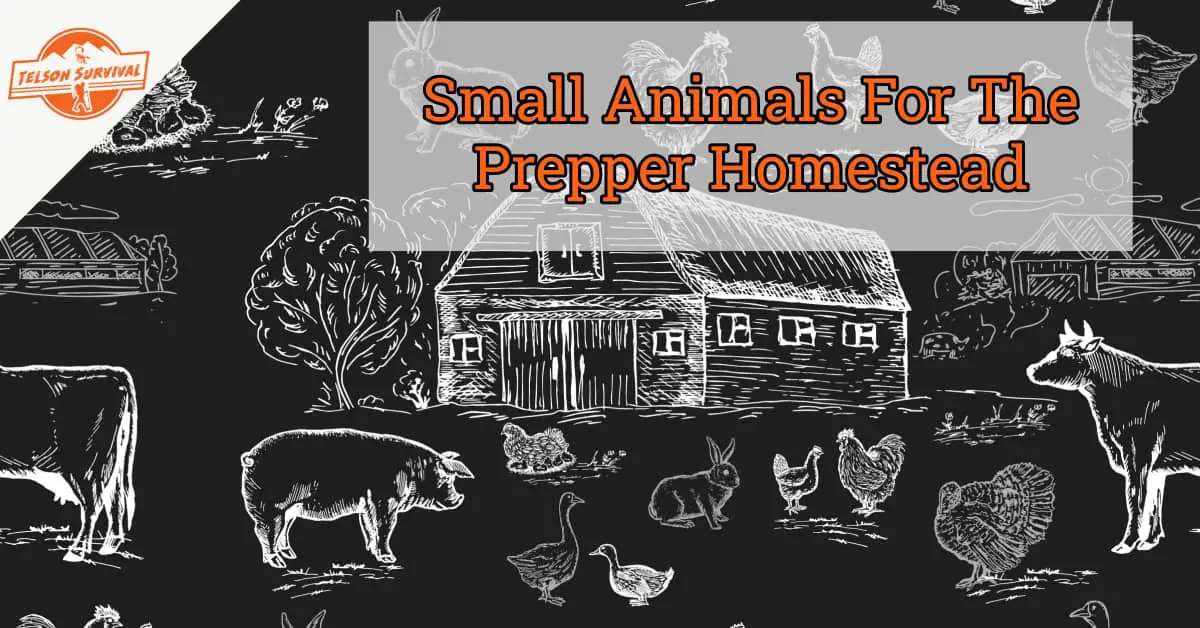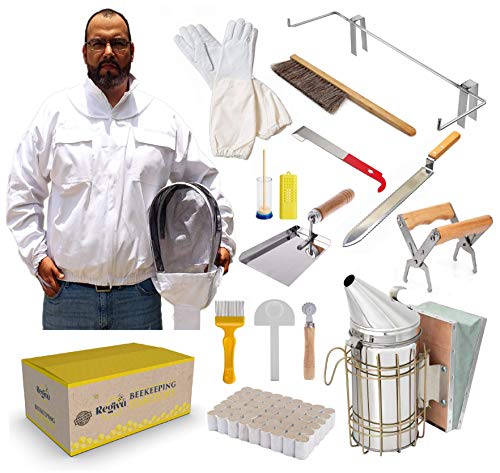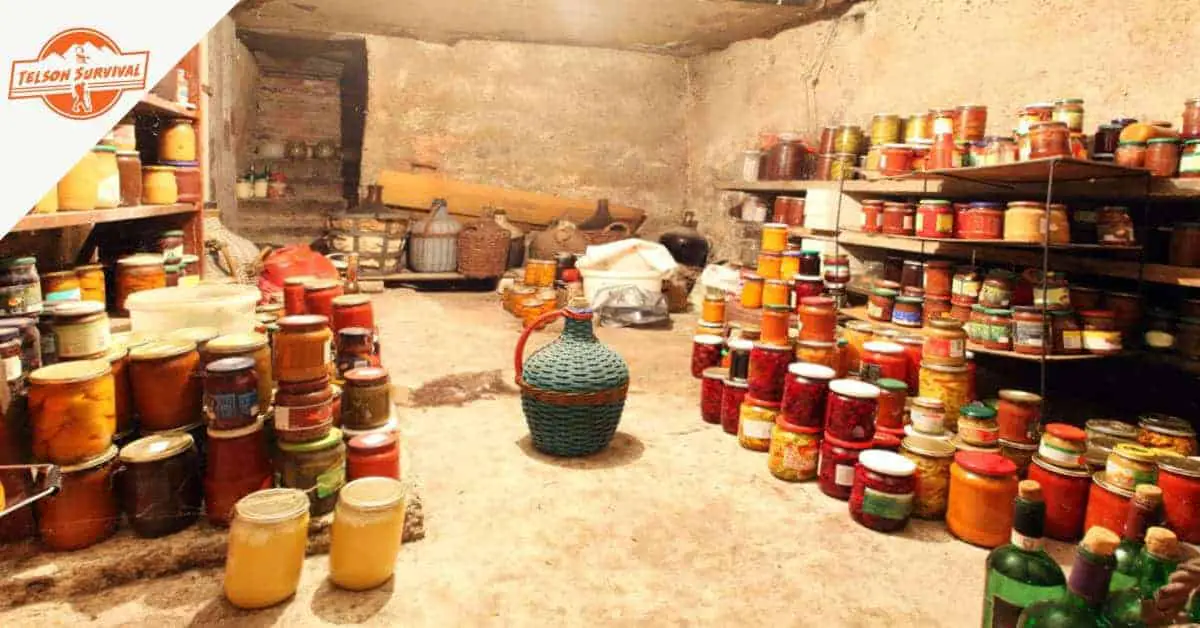As a prepper, you know that having a survival garden is one of the best ways to increase your self-sufficiency and prep for food security for an uncertain future.
As your survival garden grows, you will undoubtedly come to realize that there are countless reasons why you should include small homestead animals in your setup. Small animals can contribute a lot to the food security of a household; meat, eggs, and milk, just to get started.
But these animals can also make invaluable contributions to the homestead itself: fertilizer, pest control, mulch, and plowing services can all be had through the strategic raising of small animals in the survival garden. Low maintenance homestead animals are the key to a self-sufficient farm.
In this guide to the best small animals for self-sufficiency, we're going to tell you which animals are key for the survival garden and we'll explain how to incorporate them into your homestead. This setup will turn your farm into a true self-sufficient prepper homestead in case SHTF.
Here is our complete list of small animals preppers should raise in their survival garden:
Why Homestead Animals Matter For Preppers
Small and large animals are important for any garden set up because they are the fundamental key in what is known as closed-loop agriculture.
There are lots of books and articles written about why closed-loop agriculture is so important for the health of the environment. But the bottom line is that it is the only sustainable method of farming that will keep your belly full after SHTF and your survival food cache has run out.
The concept is simple. All of the organic waste that a farm and a household creates is recycled back into the soil.
The result is perpetually healthy balanced soil that will guarantee abundant harvests in your survival garden. No need to run to the hardware store to purchase soil amendments. This is really important if there are no hardware stores or fertilizers become prohibitively expensive.
With the right small animals on the farm, you can achieve real self-sufficiency and be prepared for anything.
How do small animals benefit the soil of a survival garden?
Poop. It all has to do with their poop.
It sounds almost absurd, but you need to shift your thinking about raising homestead animals for food to raising them for their poop. Food is just a nice perk along the way.
All farm animals, no matter how small, are eating constantly and defecating constantly. If your animals are eating grass, weeds, garden scraps, or kitchen waste, they are effectively recycling all of that into invaluable fertilizer for your crops.
Another service that some small animals provide is plowing and tilling. Chickens, ducks, and even rabbits (if left to their own devices) will aerate, turn over, and help to loosen compacted soils.
Some farmers will let certain animals into their planting areas after a harvest to turn under all the leftover crop residues. Sometimes these animals are allowed to roam in an area before it is planted out to eliminate pests, weeds, and add a quick dose of fresh fertilizer.
If caring for the health of your soil is your top priority for your survival garden (and it should be) then you absolutely need to include these low-maintenance farm animals.
9 Best Small Animals For Homesteading Preppers
Here are our top recommendations for the best animals for self-sufficiency.
You'll notice that not all of them are animals in the traditional sense. But they are all living creatures that need a little bit of time and attention to prosper. With minimal effort, they will bring countless benefits to your survival garden or homestead.
Chickens
Chickens top nearly every list of the best backyard animals. It's easy to see why.
Chickens are relatively easy to care for once you have the basic infrastructure set up. Their needs are simple; a warm sheltered space for them to roost and lay, clean water, food, and room to roam.
What they provide to your family is also greatly appreciated: fresh eggs and flavorful meat.
Chickens are amazing homestead animals because they create high quality, nitrogen-rich fertilizer that will do wonders for your plantings. They will also eat bugs and other pests, scratch and till the soil, and help control weeds.
From a survivalist perspective, you will want to raise a reproducing flock. If carefully managed, you can quickly breed enough chickens to provide your family with enough meat and eggs to never have to buy them from a store again. You will need a rooster and a couple of hens of a broody variety that will sit on a nest to incubate eggs.
Do your research, because this instinct has been bred out of many of the commercial varieties of laying hens available nowadays.
Other points to consider when researching the best chicken breeds to buy as a prepper:
- Meat vs. egg production. Do you want a laying hen that also fattens up nicely for eventual harvesting or do you prefer a breed that is a lean mean laying machine?
- Noise factor. Chickens are not exactly noisy, but some breeds are known to be more vocal than others, especially when it comes to the rooster.
- Space needs. Some breeds do better in smaller spaces than others.
- Temperament. Some chickens can be downright ornery. If you have kids, or just want to avoid problems, look for a docile breed.
Check out this article from the Ohio State University Extension office to help you understand how to pick the best chicken breed.
In this guide, there is not enough room to discuss everything you need to know about raising chickens as part of your survival garden or homestead.
Instead, pick up a copy of Storey's Guide to Raising Chickens to get started with your research and to learn how to best take care of your chickens and incorporate them into your homestead.
Last update on 2024-12-06 / Affiliate Links / Images from Amazon Product Advertising API
Ducks
While not quite as mainstream as chickens, ducks are an incredibly useful addition to your team of small animals for the self-sufficient farm.
Ducks offer many advantages as a homestead animal for preppers:
- They graze, eating both weeds and grass.
- They destroy grubs and slugs, which are their favorite foods.
- They fertilize wherever they go.
- They are easily controlled and can be herded.
- They are excellent for preparing the land to be planted.
Ducks also benefit from and can participate in a pond system that also incorporates aquaculture practices into your survival garden.
They are not nearly as destructive as chickens and can be trusted to mostly respect your crops, though you might find yourself harvesting fewer strawberries or tomatoes if you let them free range.
In terms of food, ducks are famous for their deliciously fatty dark meat and large eggs. In fact, when it comes to egg production, you may be better off choosing ducks rather than chickens… it all depends on what breed you decide to raise. Duck eggs are incredibly flavorful and nutritious. They actually have a higher vitamin and mineral concentration than chicken eggs.
Raising ducks is relatively easy. The most important thing that you need to provide is abundant freshwater. They also need access to sources of food other than commercial feed. Bugs, grubs, and plenty of fresh greens should be on their daily menu.
As for shelter, domesticated ducks are pretty rustic. Provide them with a safe place where they are protected from predators (they are notoriously clumsy on land) and can take refuge from the weather.
Much like chickens, ducks come in a variety of breeds that you will want to thoroughly research to find what will work best for your farm. There are 17 recognized breeds and each one differs slightly in what they offer in terms of meat or egg production, pest control capabilities, noise levels, and even the quality of their feathers and down.
We recommend that you check out this helpful article from the Small and Backyard Poultry Extension to get you thinking about which breed you may want.
And be sure to find a copy of Storey's Guide to Raising Ducks for all the technical information you'll need for raising these practical homestead animals.
Last update on 2024-12-06 / Affiliate Links / Images from Amazon Product Advertising API
Rabbits
Where do we start when singing the praises of this small mammal?
One of the best homestead animals for preppers, rabbits are famous for their ability to reproduce rapidly. But did you know that these noble little wonders:
- Provide nutritionally dense meat rich in proteins, omega-3s, b-vitamins, and minerals such as phosphorus, potassium, and selenium.
- Produce micro-nutrient rich fertilizer full of nitrogen, phosphorus, potassium, and other minerals that can be applied directly to plants.
- Are easy to raise in small spaces or on marginal land.
- Require less water and food per pound of meat produced than pigs, sheep, or cattle.
The initial investment for raising rabbits is notoriously low. All you need is a wire cage, water dispenser, and plenty of fresh forage. If you have the land, you may also choose to move the rabbits around in a 'rabbit tractor'. This will reduce the amount of effort you have to put into feeding them because they can feed themselves.
Rabbits require so little space that even urban preppers can easily maintain a pair of breeding rabbits and their offspring. As for the different breeds, there are many options available. Be careful though, because some varieties make better pets than meat.
Here's what you'll want to keep in mind when deciding which type of rabbit is right for your prepping needs:
- Grow time - how fast they come to butchering weight.
- Maternal characteristics like milk production and litter sizes.
- Paternal characteristics like large muscle tone.
- Pelt quality - important if you will be harvesting the fur for spinning into yarn or the pelts for other uses.
- Weather hardiness if you live in an area with harsh winter or summer extremes.
Storey's Guide to Raising Rabbits is our preferred resource when it comes to learning the ins and outs of meat rabbit production.
Last update on 2024-12-06 / Affiliate Links / Images from Amazon Product Advertising API
Guinea Pigs
Most people think of these furry little rodents as pets. For many, it's hard to imagine eating one!
One of the best small animals for homesteading, guinea pigs were originally domesticated by the native people of the highland Andes throughout South America for their meat production. They continue to be an important part of the traditional diet in Peru and Ecuador.
Why are guinea pigs excellent homestead animals for the prepper farmer?
- They can be eaten in one meal. No need for processing or refrigeration. Butcher them as you need.
- They can be fed without concentrated feeds.
- They take only 3 - 5 months to reach their butchering weight, and yield up to ½ kg of meat.
- They reproduce quickly, giving birth four to five times a year.
- Their manure is a very high-quality fertilizer that is rich in phosphorus and nitrogen.
- Their manure can also be used as feed for other animals (like chickens) because it is very high in protein.
Getting started raising guinea pigs is easy. They do not jump or dig, so they are relatively easy to contain. They can be pasture-raised in small corrals or placed in a cage. Just make sure to provide them a place to hide and make sure they are protected from harsh temperatures and weather.
They are social animals, so you should have at least two females and a male to get started. There are quite a few different breeds of guinea pigs. It's recommended to select a short-haired variety to avoid complications and hygiene issues while raising them.
We recommend that you check out this excellent guide by Dr. Franklin Martin. It is a brief introduction on how to select guinea pig breeding stock and successfully organize and care for a small breeding herd.
Honey Bees
Definitely not an "animal", bees are still mainstays on most homesteads. They are one of the best survival garden allies that you will want to keep around on the farm.
We often think about raising animals for their meat, but with bees, we get sweet. It is much easier to produce honey by letting the bees do all the work for you than planting and processing sugar cane or beets to get sugar.
Honey is also highly medicinal and makes an excellent barter item. Did we mention that it keeps indefinitely? Honey is the ultimate survival sweetener!
You will also be able to harvest the wax from your beehives. This is yet another useful product that can be used for making creams, salves, and candle making.
But do you know the best reason to keep a beehive in your survival garden? To improve pollination.
Bees are essential for abundant harvests. As they buzz around collecting pollen for their hive, they are providing an invaluable service. With bees on the homestead, you will undoubtedly enjoy larger harvests.
When it comes to keeping bees, just like with every homestead animal, there is an initial investment. Bee's certainly require a little more infrastructure and specialized equipment than other animals for the small farm.
Luckily, it's easy to find a high-quality beekeeping starter kit to get you started. Bee boxes and frames can also be readily shipped right to your door.
Last update on 2024-12-06 / Affiliate Links / Images from Amazon Product Advertising API
And don't forget to find a guide to help you understand the ins and outs of beekeeping in your survival garden - we recommend the Beekeeper's Bible.
Last update on 2024-12-06 / Affiliate Links / Images from Amazon Product Advertising API
Fish
There are many ways to raise fish on your prepper homestead or in a survival garden. Depending on how much space you count on you may want to consider installing a pond (if you have ducks, they'll be thrilled).
You could also create a tank system that allows you to use that mineral-rich water to fertilize and water your crops. Basically, if you have a garden hose, you can raise fish.
You will want to start small until you master the basics, but eventually, you could see a substantial fish harvest every six months from a modest aquaculture set up.
Different fish species that are commonly raised include: tilapia, catfish, trout, bass, perch, and salmon. Depending on the type of setup you want or have room for, you will want to consider the different methods of raising fish on a homestead:
- Using cages: this method is simple, cheap, and easy to implement. Basically, you need to build cages that will float in a sizeable pond that you already have on your farm. Cages allow for easy harvesting when the fish reach their harvest weight.
- Aquaponics: a more costly setup, this method combines planting crops in your fish water. The crops aerate and filter the water while the fish provide totally organic sources of nutrients for hydroponically grown plants.
- Flow-Through Systems: by diverting a continuous flow of water into an enclosure, you create a naturally aerated environment to raise cold water loving species.
- Home recirculating: a setup for those with limited water supply, this uses tanks, aerators, and filters to maintain a healthy environment for the fish. The water can then be easily recycled for irrigation purposes.
Be sure to check out Small Scale Aquaculture by Steven Van Gorder to dig deeper into raising fish for survival. It is a broad subject, and he clearly explains fish farming in practical terms.
Last update on 2024-12-06 / Affiliate Links / Images from Amazon Product Advertising API
Worms
Wait… Worms? Seriously? Yes.
Every survival gardener or homesteader needs to be growing these little wrigglers. They are an essential homestead animal even if they are, admittedly, not an animal in the typical sense.
Worms are important for a farm for the exact same reason that a chicken or rabbit is good for a farm. Their poop. Worm castings, as worm poop is typically called in more scientific language, are the best natural fertilizer that you can put on your plants.
Worms work magic on everything biodegradable, breaking it down in their digestive tracts into highly absorbable fertilizer, rich in organic matter and beneficial bacteria. Worm castings will improve your soil and feed your plants.
Vermiculture is the official name given to worm farming. Whether you live in an urban apartment, the suburbs, or a large farm - you can easily incorporate these amazing homestead animals into your survival garden.
Larger setups can be designed to process farm wastes and crop residues. If you have enclosed rabbits or chickens (or larger animals like horses or cows) you can process all of their manures through your worms and create an unbeatable quality soil amendment.
For smaller setups, you can process all kitchen waste and organic packaging with a small and compact worm composting system. When your worms start reproducing you can harvest them to feed your fish, ducks, or chickens.
Last update on 2024-12-06 / Affiliate Links / Images from Amazon Product Advertising API
If your survival farm or homestead is going to be self-sufficient, you need to find ways to make one element blend into and work with the others.
Worms are one of the best small animals for self-sufficiency because they work as the glue that pulls everything together, allowing you to produce multiple products necessary to maintain the health of your crops.
Goats
Do you have a fair amount of space and want to make the most of your land? If so, consider raising some common homestead animals that are on the larger side. You will have to put in a little more effort, but the payoff is worth it.
There is a reason that the goat is one of the main animals raised in the developing world. If there is one animal suited for survival, this is it. And we're not talking about your survival - the goat is a master of survival and an example for all of us.
Goats can eat just about anything. Weeds, bark, grass… you name it. There is very little they will not devour. This means that you will need to take extra care protecting your plantings. At the same time, their forage area does not have to be an impeccably maintained pasture. They are truly a low maintenance farm animal.
There are many products that you can produce from a goat: meat, wool, pelts, leathers, and dairy products.
Here are some other reasons why it's easy to keep a small goat herd as a prepper:
- They are relatively easy to handle.
- They can be transported easily.
- They reproduce more frequently.
- Have minimal housing requirements
Goats also produce the most important of products: poop.
If you keep your goats in stalls and have a bedding system where the pellets mix with urine and straw, an excellent mulch will be made that will both protect your soil and fertilize your crops.
Their manure, in general, is dry and doesn't attract pests or bugs. It can be applied directly to your crops without the risk of burning them.
There are many different breeds of goat, so you will need to do your research to figure out which one is best for your needs. There are dairy breeds, meat breeds, and crosses that are a happy medium.
We recommend checking out Storey's Guide to Raising Dairy Goats or Storey's Guide to Raising Meat Goats to get the lowdown on the different breeds and the best way to care for them.
Last update on 2024-12-06 / Affiliate Links / Images from Amazon Product Advertising API
Pigs
Pigs have always been an essential prepper homestead animal. They are truly one of the best animals for self-sufficiency. The quality and quantity of meat, fats, and leather are exceptional.
Pigs have often been used to process and recycle the abundance on a farm. Fruits that didn't get harvested, acorns and nuts that never got collected, whey leftover from cheese making, and even leftovers from beer brewing were typically fed to hogs.
If permitted to pasture, hogs can turn over a field quickly, eliminating weeds and pests before or after planting. They'll also leave a fresh dose of fertilizer that will give your crops an immediate boost.
If you plan on keeping your pigs enclosed, make sure the pen is sturdy - pigs are particularly intelligent and are adept escape artists.
When choosing which breed of pigs to work with, be sure to consider the following factors:
- Size
- Temperament
- Rusticity
- Meat quality
- Mothering and reproduction capabilities
- Capacity to thrive on pasture
- Susceptibility to temperatures
Pigs definitely require a fair amount of space, especially if they are to be pasture-raised. If they will be in confinement, you will need to have a strategy for managing and processing their waste.
All animals need fresh dry bedding, a solid shelter, and lots of fresh water. You might be surprised to learn that they are actually quite clean animals that they organize their living space hygienically.
There is way more that goes into raising hogs. While they are not complicated to raise, they are not among the best farm animals for beginners.
Again, Storey's has a highly recommendable Guide to Raising Pigs that you should read if you decide you want to start raising them on your survival farm.
Last update on 2024-12-06 / Affiliate Links / Images from Amazon Product Advertising API
Raising Animals - Is It Legal?
It's probable that by now you are hearing your own version of "Old McDonald Had a Farm" as you imagine expanding your survival garden and incorporating a homestead animal or two into your plan for self-sufficiency.
But we need to put a disclaimer out there. Check your local laws and regulations before investing in any animal. Zoning regulations vary widely from town to town and state to state. Do your research to avoid fines or citations.
What do I do with my animals if SHTF?
This is a great question, but the answer is not so simple. As preppers, we know that when SHTF it could be an immediate emergency that will eventually resolve itself (like a wildfire, tornado, hurricane, etc) or it could be a serious long-term change in how our world works.
What you do with your animals will depend on what the situation calls for and has a lot to do with your individual circumstances.
You may need to set them loose so they can fend for themselves with the hope of recovering them later. You may also need to hide them for their own safety and yours.
Read up on the relevant advice for the different scenarios that could impact you and how to best care for your animals under those circumstances. Many specialized associations offer advice on how to best handle your farm animals in emergencies.
Keeping certain homestead animals will benefit even the smallest of survival gardens. Do your research and jump in. Don´t fear the unknown. Educate yourself and be prepared.
Important Post Script About Storey's
In case you were wondering, this article was not sponsored in any way by the folks who write the Storey's Guide books. We just really like them.
They are thorough and easy to understand books that you will refer to time and again as you learn about the animals you are raising and how to raise them right.
The Storey's Guide to Raising series is an entire library worth having on the shelf if you have a diversified homestead with different kinds of animals in your care. Be sure to check them out!



















